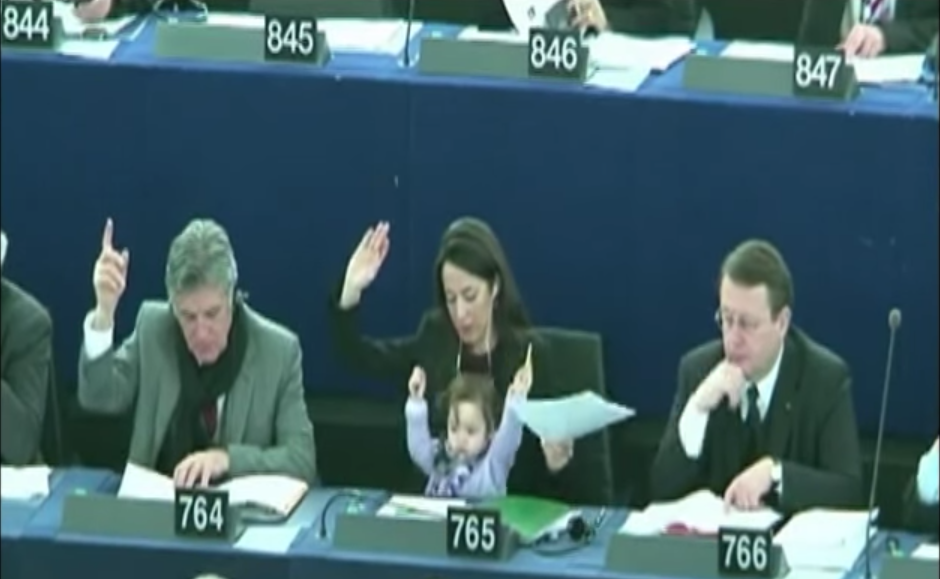
Member of European Parliament for Italy, Licia Ronzulli, voting with her 3-year-old daughter, Vittoria. Image courtesy of World News.
One morning about eight weeks ago, one of my colleagues rushed into our Midtown offices forty-five minutes later than his usual arrival time. As if late for a meeting, he’d already half divested himself of his coat and scarf and looked flustered, frustrated, and mildly pained; in our open-plan office, his feelings were on display for anyone looking up from a desk. It was clear that this was not how he’d intended his day to start. Usually, he’s the most unflappable colleague: kind, smart, thoughtful, never raising his voice or talking over anyone, yet always making authoritative and clear points.
However, the most unexpected aspect of his arrival was the young child standing beside him: his young child. I knew much about my colleague—his research interests, where he had traveled during various points in his career, what he had been working on that week—but I had no idea about his family life. It turned out that his child’s nanny had a mishap that morning and hadn’t made it to their home, and so my colleague brought his kid to work. The child sat and quietly played games that morning, a welcome addition to our usually mono-generational office. The department felt positively European for a few hours.
It is a given that we hide a lot of ourselves at work; professional etiquette applies. In necessary and unnecessary ways, similar to those that lead us to shape our best selves for public consumption on social media, we conceal our non-office lives from our office lives. It seems fair that I would not know the details of the lives of people I work alongside. But I spend more waking hours around my colleagues than I do with my husband, my cat, and my immediate family. (This week—admittedly a busy one—I will have spent seventy-one hours at work and approximately twelve with my husband.) In the office in which I work, it is quite unusual to talk about our families; we are silent not just about the topic of children but also about people of all ages who are pivotally important in our lives and who need our time, and who we need to spend time with. Is this the same everywhere? (And will it change as federal and corporate policies on familial leave do?) I asked my friends (most of whom work in the arts) who have children and who care for parents about such silence in their professional spheres, and their responses were as I expected: If they live in the United States, their true personal lives are often concealed at work, and this usually means a stressful double life. Those in Canada or Europe still experienced stress, but this was mitigated by greater choice, agency, and peer precedent; government-supported family leave means they are able to make different decisions about how to balance their home and work lives. (I warmly welcome opinions from outside the Northern hemisphere too!)
About the (one and only) time I met my co-worker’s child, a Princeton assistant professor of psychology and public affairs, Johannes Haushofer, published his “CV of failures.” His exercise in professional transparency was prompted by Melanie I. Stefan, a lecturer in biomedical sciences at the University of Edinburgh. Stefan published an article in Nature in 2010, in which she underscored the “narrative of success that renders our setbacks invisible both to ourselves and to others.” She continues, “Often, other scientists’ careers seem to be a constant, streamlined series of triumphs. Therefore, whenever we experience an individual failure, we feel alone and dejected.”1 Everyone has one of these CVs, whether or not we’ve published them, like Haushofer. I am often asked to speak about “a day in the life of a curator” or “how to get a museum job.” I’m vocal in person about what’s hidden on paper, the shadow resume that gave me a skill set I use every day in the museum world but, like my colleague’s daughter, remains in the background.2 Haushofer’s honesty was refreshing, and his project went viral, garnering praise from all corners of the Internet. It was also easy to criticize his project, given that he experiences privileges as a White male working within an Ivy League school. This year’s HarvardxDesign conference on failure—at which, for full disclosure, I moderated a panel on design for health—I observed a similar conundrum. Presentation after presentation suggested that, seen from certain positions, fucking up can seem beautiful and instructive, ready-made for a motivational TED talk, and thus perhaps a little disingenuous. One has to operate from a place of relative security to know about opportunities, and from a place of relative confidence to apply for them, even though one may not receive what one asks for every time.
Knowledge is power. Transparency can empower. Revealing the messier aspects of our lives is easier said than done—and there’s a time and a place for everything—but we often say at work, “Let’s put this job in perspective: we’re not saving lives.” It’s true. But we’re living them, and shaping them, and nurturing them in spaces like museums and studios and classrooms. Sometimes we need to start with our own.
1. Melanie Stefan, “A CV of Failures,” Nature.
2. I have had many non-art jobs, such as: lawn mower, pot washer, census-form mailer, model, waitress, babysitter, cleaner, cook, nanny. My first museum job was as a security guard because it was the only arts-related job that paid. I still count myself as contingent labor; like all junior curators at the Museum of Modern Art, I am on a four-year, non-renewable contract.



